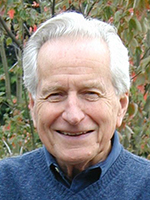01 Dec2014
By Kristin McCabe
 John I. Goodlad, a giant in 20th-century education and former elected president of AACTE, died November 29 in Seattle. He was 94.
John I. Goodlad, a giant in 20th-century education and former elected president of AACTE, died November 29 in Seattle. He was 94.
After 8 years of teaching in his native Canada — in the challenging conditions of a one-room schoolhouse and, later, a juvenile detention center — Goodlad completed his bachelor’s and master’s degrees at the University of British Columbia and then came to the United States for doctoral work at the University of Chicago. By age 29, he was head of teacher education at Emory University (GA). He briefly returned to the University of Chicago before moving in 1960 to the University of California Los Angeles, where he spent 24 years, the last 16 as education dean.
10 Nov2014
By Gerardo Gonzalez
Editor’s Note: In this opinion piece written for his local newspaper, Gonzalez provides his perspective on the enrollment decline in his state’s teacher preparation programs. This post originally appeared in the Indianapolis Star and is reposted with permission. The views expressed in this post do not necessarily reflect the views of AACTE. See also Sharon P. Robinson’s recent post calling national attention to the same topic.
I was pleased to see Tim Swarens’ Oct. 26 column making the point that education reform in Indiana needs a conversation not confrontation. That conversation should start with an honest assessment of the impact of reform efforts to date.
Over the last decade, teacher salaries in constant dollars in Indiana have decreased by more than 10%. Outpaced only by North Carolina, which experienced teacher salary decreases of 14%, Indiana had the second largest decrease in the country.
04 Nov2014
By Zachary VanHouten and Deborah Koolbeck
As the National Council on Teaching Quality (NCTQ) steps up its document collection by communicating directly with teacher preparation programs’ PK-12 partners, AACTE encourages programs to reach out to their partner schools to raise awareness and build mutual understanding around the requests, including connecting legal counsel from both parties if appropriate.
28 Oct2014
By Kristin McCabe
 Georgia, Ohio, Montana, New Hampshire, and Utah have been selected to receive technical assistance from the University of Florida College of Education’s Collaboration for Effective Educator Development, Accountability, and Reform (CEEDAR) Center. The center supports states in developing educators to prepare students with disabilities for colleges and careers.
Georgia, Ohio, Montana, New Hampshire, and Utah have been selected to receive technical assistance from the University of Florida College of Education’s Collaboration for Effective Educator Development, Accountability, and Reform (CEEDAR) Center. The center supports states in developing educators to prepare students with disabilities for colleges and careers.
29 Aug2014
By Elizabeth Ross
The Collaboration for Effective Educator Development, Accountability, and Reform Center (CEEDAR Center) has released three new program evaluation tools, called innovation configurations, in partnership with the Center on Great Teachers and Leaders at the American Institutes for Research. The innovation configurations are designed to help evaluate teacher preparation programs and professional development activities for the extent to which they incorporate evidence-based practices in a particular area:
26 Aug2014
By Cap Peck and Gail Bozeman
This summer, Chief Representatives at 400 randomly selected AACTE member institutions are participating in a survey on data use in their teacher preparation programs. If your institution has been invited but has not yet participated, please complete the survey to inform our future technical assistance and other member services around data use.
Each survey respondent receives an Amazon gift card as a token of appreciation. What’s more, some participants report a benefit from the survey itself. One dean said the survey “posed so many great, thoughtful questions and really forced me to think through our programs and how we are/are not using data effectively.
18 Jun2014
By Sharon Robinson
Yesterday, the National Council on Teacher Quality (NCTQ) released its second annual Teacher Prep Review: A Review of the Nation’s Teacher Preparation Programs. Although parts of this report venture a conciliatory tone, as might be expected from NCTQ’s past reports, this review offers largely unhelpful recommendations that are based on questionable methodology.
Public Shaming—Over a Document Review
In an attempt to provide a consumer-friendly guide to teacher preparation programs, NCTQ has moved from rating institutions on a 4-star scale to ranking them numerically—a divisive tactic that mostly serves to pit institutions against one another. Notably, these rankings have as little to do with graduates’ readiness to teach as did last year’s star system.
17 Jun2014
By Saroja Barnes
The Innovations Inventory of AACTE’s Innovation Exchange is an online database highlighting members’ pioneering practices in educator preparation that have shown a positive impact on issues of student learning, preparation program advancement, or educator workforce needs. This blog post is one in a series highlighting entries from the inventory. To request inclusion of your institution’s innovations, contact Kristin McCabe at kmccabe@aacte.org.
 Faculty in the Graduate School of Education at Lesley University (MA) have built a comprehensive e-portfolio and assessment system to provide data on candidate performance and support continuous improvement processes. The assessment system aligns key formative assignments in initial, professional license, and advanced professional development programs to standards-based program outcomes. Candidates submit all assignments to an e-portfolio system, where faculty score them based on valid and reliable rubrics. The assessment system also contains data on candidate performance on state exams and summative performances from clinical experiences.
Faculty in the Graduate School of Education at Lesley University (MA) have built a comprehensive e-portfolio and assessment system to provide data on candidate performance and support continuous improvement processes. The assessment system aligns key formative assignments in initial, professional license, and advanced professional development programs to standards-based program outcomes. Candidates submit all assignments to an e-portfolio system, where faculty score them based on valid and reliable rubrics. The assessment system also contains data on candidate performance on state exams and summative performances from clinical experiences.
10 Jun2014
By Elizabeth Ross
The Innovations Inventory of AACTE’s Innovation Exchange is an online database highlighting members’ pioneering practices in educator preparation that have shown a positive impact on issues of student learning, preparation program advancement, or educator workforce needs. This blog post is one in a series highlighting entries from the inventory. To request inclusion of your institution’s innovations, contact Zachary VanHouten at zvanhouten@aacte.org.
 Georgia State University (GSU) is the largest producer of minority educators in the state of Georgia and graduates approximately 500 teachers annually. GSU’s Network for Enhancing Teacher Quality (NET-Q) program aims to increase teacher quality in urban and rural areas in Georgia. The program includes both pre- and postbaccalaureate initiatives for educators serving high-need school districts in these settings.
Georgia State University (GSU) is the largest producer of minority educators in the state of Georgia and graduates approximately 500 teachers annually. GSU’s Network for Enhancing Teacher Quality (NET-Q) program aims to increase teacher quality in urban and rural areas in Georgia. The program includes both pre- and postbaccalaureate initiatives for educators serving high-need school districts in these settings.
NET-Q boasts a partnership with at least 15 rural PK-12 schools, local businesses, two historically Black colleges, and the National Commission on Teaching and America’s Future.
03 Jun2014
By Alicia Ardila-Rey and Cap Peck
In the next few days, Chief Representatives at 400 randomly selected AACTE member institutions will receive an invitation from the Association to complete a survey on data use in their teacher preparation programs.
As readers of this blog know, teacher preparation institutions are under increasing pressure to provide data on the effectiveness of their programs and to use these data to make decisions about ongoing program improvement. However, a growing body of research shows that using data to make decisions about policy and practice involves much more than collecting, aggregating, and analyzing information. In order to understand what it takes to go from collecting to effectively using data, AACTE and the University of Washington have been collaborating over the last 2 years on a Spencer Foundation-sponsored project focused on describing how teacher education programs are learning to use new sources of outcome data for the purposes of program improvement.
20 May2014
By Saroja Barnes
The Innovations Inventory of AACTE’s Innovation Exchange is an online database highlighting members’ pioneering practices in educator preparation that have shown a positive impact on issues of student learning, preparation program advancement, or educator workforce needs. This blog post is one in a series highlighting entries from the inventory. To request inclusion of your institution’s innovations, contact Jessica Milton at jmilton@aacte.org.
In response to the call for increased rigor and effectiveness in teacher preparation, one of the largest teacher preparation programs in the country, Mary Lou Fulton Teachers College at Arizona State University (ASU), implemented iTeachAZ. The program includes changes in teacher preparation that focus on improvements in candidates’ content knowledge mastery, classroom readiness, and assessment literacy. The program provides a senior-year residency experience that extends student teaching from a single semester to a full school year, enabling students to live the “full life” of a teacher. ASU has also integrated performance assessments throughout the teacher preparation program.
15 May2014
By Kristin McCabe

Alverno’s Mary Diez (right) with her SSSF vice presidents
It’s hard to believe, but it’s true: After 38 years, Mary Diez is leaving Alverno July 1.
Diez, professor and former dean of the School of Education at Alverno College (WI), was elected last month to a 4-year term as president of the School Sisters of St. Francis (SSSF), an international congregation with 850 sisters in the United States, Europe, India, and Latin America. This full-time commitment will take her to all of those places, although she plans to retain her campus residence at the college where she has lived for nearly 4 decades.
Taking her leadership skills off campus is hardly new for Diez, whether as a consultant in the Milwaukee community, member of standards boards, convener of assessment institutes, champion of dispositions work, or president of AACTE—among countless other roles she has held around the country and internationally. Despite having so much on her plate, Diez generously responded to my questions this week about her career to date and future plans.
13 May2014
By Elizabeth Ross
 The Collaboration for Effective Educator Development, Accountability, and Reform (CEEDAR) Center, a national center funded by the U.S. Department of Education Office of Special Education Programs, seeks state partners—including state education agencies (SEAs) and educator preparation programs (EPPs)—to work collaboratively on teacher and leader effectiveness across the career continuum to help students with disabilities achieve college and career readiness in inclusive settings.
The Collaboration for Effective Educator Development, Accountability, and Reform (CEEDAR) Center, a national center funded by the U.S. Department of Education Office of Special Education Programs, seeks state partners—including state education agencies (SEAs) and educator preparation programs (EPPs)—to work collaboratively on teacher and leader effectiveness across the career continuum to help students with disabilities achieve college and career readiness in inclusive settings.
States may apply to the CEEDAR Center for intensive technical assistance for up to 4 years. Grantees will create strategic partnerships among SEAs and EPPs to support educator preparation faculty and administrators, researchers, state policy makers, and school-based professionals in building and sustaining an aligned, coherent, and systemic approach to personnel preparation. An online application must be submitted by August 1 by the state’s chief school officer or designee, in collaboration with the partnering SEA and EPPs.
02 May2014
By Saroja Barnes
 AACTE has selected 10 institutions to participate in the Association’s first Networked Improvement Community (NIC), aimed at increasing the diversity of our nation’s teacher candidate pool by focusing on recruitment of more Black and Hispanic men into teacher preparation programs.
AACTE has selected 10 institutions to participate in the Association’s first Networked Improvement Community (NIC), aimed at increasing the diversity of our nation’s teacher candidate pool by focusing on recruitment of more Black and Hispanic men into teacher preparation programs.
More than 50 AACTE member institutions in 25 states applied to be a part of this NIC, known as Changing the Demographic Makeup of the Teaching Workforce. Following a rigorous review by the AACTE Committee on Professional Preparation and Accountabilty, AACTE congratulates the following institutions on their selection:
23 Apr2014
By Elizabeth Ross
Last week, I participated in a summit at Lock Haven University in Pennsylvania on implementing and preparing for the Pennsylvania Core Standards. In attendance were the institution’s president and vice provost along with faculty, deans, and other administrators from throughout the university. Administrators and teachers from nearby PK-12 school districts as well as representatives from the Pennsylvania Department of Education also joined us.
Following my keynote presentation discussing the fundamental instructional shifts of the Pennsylvania Core, all vested stakeholder groups took part in a conversations addressing the impact of the standards on their programs and the supplemental changes necessary to enact to support implementation. Among the suggested changes were strengthening ties with the PK-12 districts to provide necessary clinical experiences for candidates and deepening core content knowledge of both in-service and preservice teachers. One great idea was for the university to host academies throughout the summer to provide training for PK-12 teachers and administrators.
 John I. Goodlad, a giant in 20th-century education and former elected president of AACTE, died November 29 in Seattle. He was 94.
John I. Goodlad, a giant in 20th-century education and former elected president of AACTE, died November 29 in Seattle. He was 94.






 Georgia, Ohio, Montana, New Hampshire, and Utah
Georgia, Ohio, Montana, New Hampshire, and Utah  Faculty in the Graduate School of Education at Lesley University (MA) have built a comprehensive e-portfolio and assessment system to provide data on candidate performance and support continuous improvement processes. The assessment system aligns key formative assignments in initial, professional license, and advanced professional development programs to standards-based program outcomes. Candidates submit all assignments to an e-portfolio system, where faculty score them based on valid and reliable rubrics. The assessment system also contains data on candidate performance on state exams and summative performances from clinical experiences.
Faculty in the Graduate School of Education at Lesley University (MA) have built a comprehensive e-portfolio and assessment system to provide data on candidate performance and support continuous improvement processes. The assessment system aligns key formative assignments in initial, professional license, and advanced professional development programs to standards-based program outcomes. Candidates submit all assignments to an e-portfolio system, where faculty score them based on valid and reliable rubrics. The assessment system also contains data on candidate performance on state exams and summative performances from clinical experiences. Georgia State University (GSU) is the largest producer of minority educators in the state of Georgia and graduates approximately 500 teachers annually. GSU’s
Georgia State University (GSU) is the largest producer of minority educators in the state of Georgia and graduates approximately 500 teachers annually. GSU’s 

 AACTE has selected 10 institutions to participate in the Association’s first
AACTE has selected 10 institutions to participate in the Association’s first